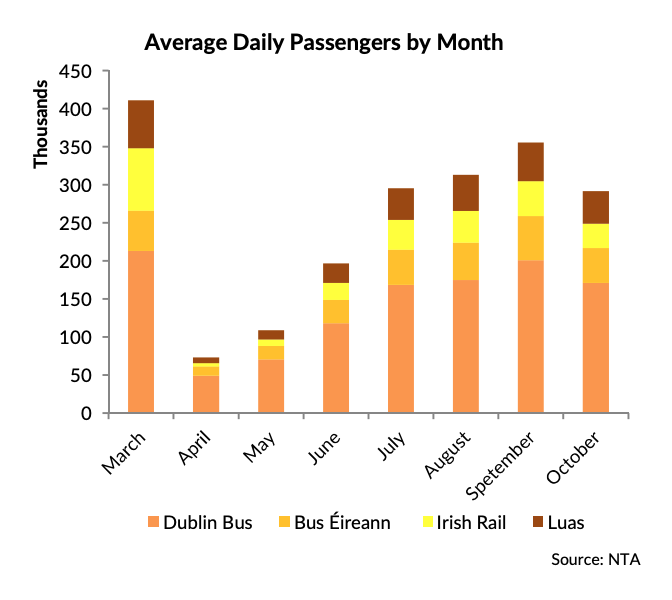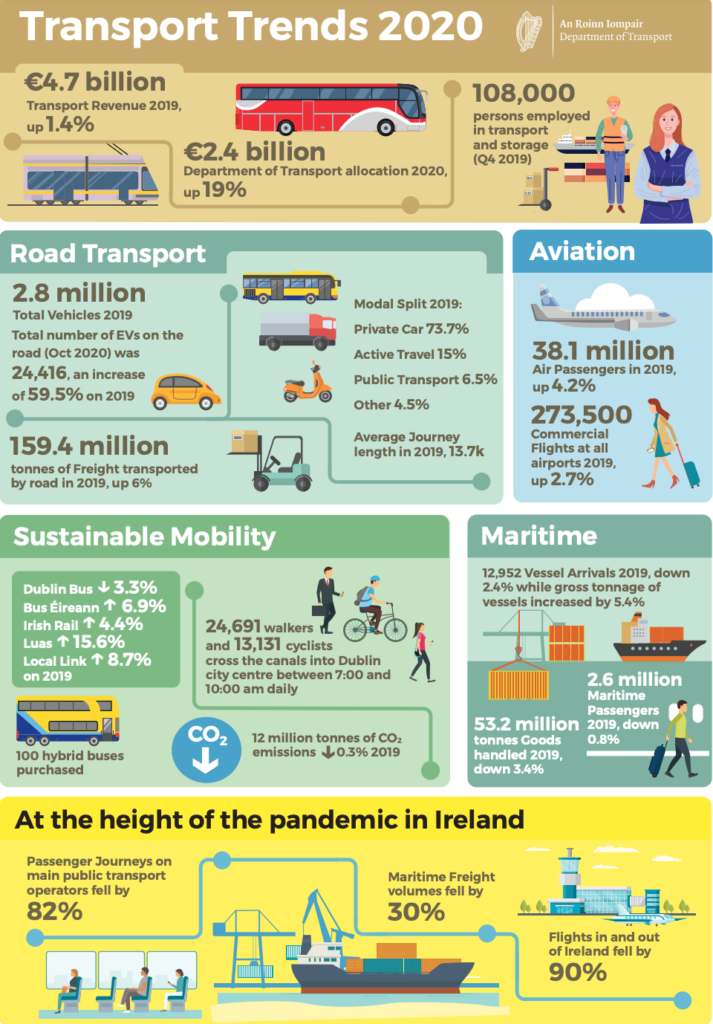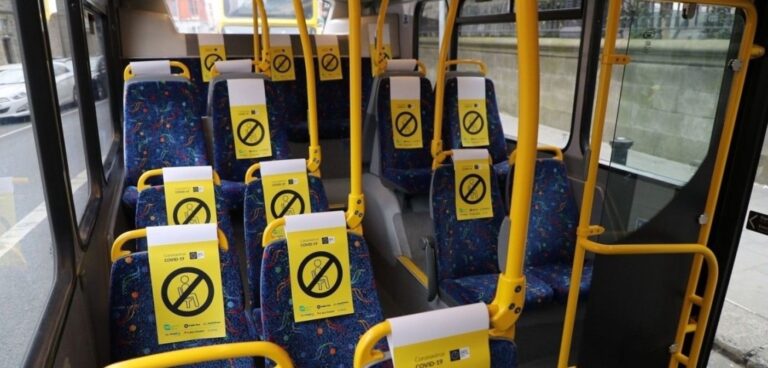Ireland’s Department of Transport (DoT) has revealed the effects of the coronavirus pandemic on the country’s transport sector in 2020, with details published in a new report.
Using the latest transport data to provide an overview of travel patterns in road transport, aviation and sustainable mobility, Transport Trends 2020 mainly covers data from 2019 but also has a dedicated section covering Covid-19’s impact on the Irish transport sector up to the end of Q3 2020.
According to the report, produced by the Irish DoT’s Strategic Research and Analysis Division, at the height of the pandemic in Ireland passenger journeys on the country’s main public transport operators fell by 82%. The data also shows average daily passenger numbers for Ireland’s four main operators fell from 410,913 passengers in March 2020 to 73,179 in April 2020.
Traffic volumes in 2020 were also impacted by the pandemic, with the average number of vehicles down from 4.2 million in March to 1.8 million in April, representing a 58.8% drop. In addition, the report states that both public transport passenger volumes and traffic levels increased slowly as restrictions were eased before falling once again as new travel restrictions were imposed.

However, pre-pandemic, transport revenue in Ireland increased by 1.4% to €4.7bn in 2019. There was also a reduction in both total kilometres driven on Irish roads and private car kilometres by 1% and 1.5% respectively, as well as a 4.8% increase in the use of sustainable and active modes of transport.
Some 24,691 walkers and 13,131 cyclists, as measured during Ireland’s National Transport Authority’s annual Canal Cordon Count, crossed the canals into Dublin city centre between 07:00 and 10:00 daily. Furthermore, there was 981km of cycling infrastructure within the Dublin Metropolitan Area in 2019. The largest share of this was made up of on-road painted cycle lanes (37.5%), while cycle infrastructure that was shared with pedestrians or at footpath level accounted for 34.6% in 2019.
By contrast there was a rise of 3% in the number of public transport passenger journeys on the four main state operators in 2019, a total of 326.1 million, while Irish road freight activity – measured by total road freight tonne kilometres – increased in 2019 by 7.5%, to the highest levels of activity seen in 10 years (12.403bn tonne km). What’s more, some 159.4 million tonnes of freight was transported by road in 2019, up 6%.
In terms of road safety, according to the report, provisional data records show there were 140 fatalities on Irish roads in 2019, an increase of 1.4% from 2018. European Commission data showed that Ireland had the safest roads in the European Union in 2018, with 2.5 deaths per billion car passenger kilometres.
Of the 2.8 million road vehicles in Ireland in 2019, 73.7% were private cars, 15% were active travel modes, 6.5% comprised public transport and 4.5% was made up of other transport modes. The average journey length in 2019 was 13.7km.

By October 2020, the total number of EVs on Irish road was 24,416, an increase of 59.5% on 2019. The vast majority of these vehicles (23,374) were private cars, with the remainder made up of goods vehicles and small public service vehicles, such as taxis.
Of the private car EVs on the road in October 2020, 52.5% were battery-electric vehicles while the remaining 47.5% were plug-in hybrid electric vehicles. In 2019, according to ESB data, there were 723 EV charging stations in operation in Ireland, 652 of which were on-street chargers and the remaining 71 were fast chargers.
Meanwhile, Ireland’s public service obligation (PSO) bus fleet grew by 3.9% to stand at 1,770 buses in Q4 2019. This growth was driven by growth in other tendered services, including those operated by Go-Ahead Ireland, by 64.8%. There were nine hybrid buses operating in the Dublin Bus fleet in 2019, while a further 100 have been ordered to service the urban PSO fleet.
This uptake in sustainable mobility subsequently impacted Ireland’s transport sector, which emitted approximately 12.2 million tonnes of CO2 equivalent in 2019, a slight decrease of 0.3% from 2018. However, Ireland’s transport sector was responsible for 20.3% of Ireland’s greenhouse gas emissions in 2019, making it the second largest contributing sector.






